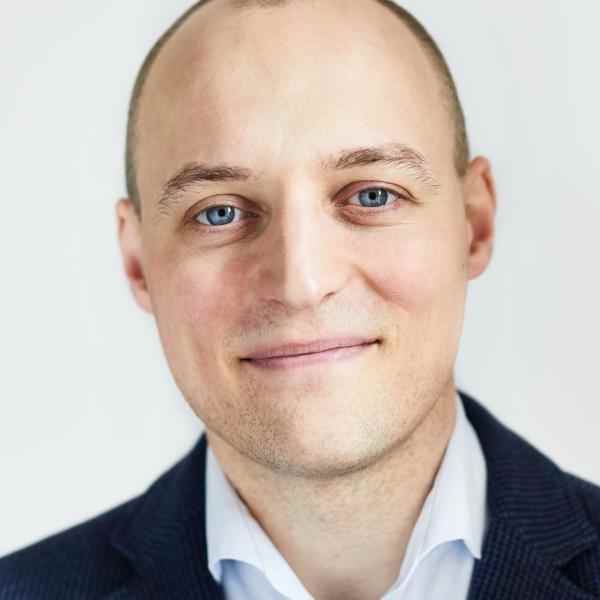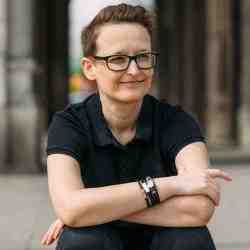Introduction
Martin has built and fortified Czechia’s field of palliative care by developing an evidence-driven approach that identifies blind spots amongst key stakeholders and cultivates new collaborations and links to remove them.
The New Idea
Martin has created a new way to engage, inform, and build bridges in and beyond Czechia’s healthcare ecosystem to accelerate the standardization of compassionate and evidence-based end-of-life care. He founded the Center for Palliative Care in 2014 to do two things: to prioritize scientific research and data collection on what terminally ill patients want and need as they near death, and to use that knowledge to catalyze hospitals, care homes, hospices, GP offices, and government ministries to co-create strategies that institutionalize patient-centered best practice. Recognition that different stakeholders are at different stages in their learning and implementation journeys and require multiple entry points is key. It is why the Center has published more than 50 data-driven studies, often in collaboration with leading professional associations and European universities, on patient-centered palliative care. It is why the Center offers multiple trainings for stakeholders each year, ranging from those that help doctors to communicate bad news effectively to terminally ill patients, to those on palliative care fundamentals for carers and social workers, to those on end-of-life planning for healthcare professionals and the general public alike. And it is why the Center has cultivated bespoke collaborations with stakeholders large and small rather than engage in direct service delivery with hospitals alone. Martin’s work accelerates cooperation between public and private sector care, and between previously siloed departments in both hospitals and government, to strengthen existing practices and build new ones. It also encourages more open and fluid communication about death and dying between the terminally ill, their family members, and doctors and nurses.
Martin’s skill at building trust and catalyzing relationships around a shared goal has changed end-of-life care and how people talk about it. In 2021 alone, the Centre trained nearly 2,000 healthcare professionals across 27 Czech cities. Hospitals have subsequently developed data-informed palliative care teams. GPs are encouraging more frank discussion with patients about death and dying and delivering terminal diagnoses forthrightly and caringly. Care homes have adopted palliative policies and practices. Hospices have co-created an innovative framework to measure the quality of end-of-life care. Prague’s emergency services are now using a tool to help determine whether a terminally ill patient for whom an ambulance has been called would prefer to stay home. The Ministry of Health and many other stakeholders are more than ever involved in supporting the development of palliative care and take part in advisory and implementation boards of programs that Martin initiates and coordinates. Martin’s conservative estimate is that 10,000-15,000 people have already benefited from this more compassionate approach that is now shared across multiple healthcare system actors.
The Problem
Although Czechia now has a good network of hospices, the spread of palliative care best practice to the country’s hospitals, GP offices, and care homes has been slower than in Western Europe. This is the case elsewhere in the region, too, due largely to challenges posed by the legacy of communism. But as the OECD reported in February this year, all of Europe and beyond have work to do to ensure more universal access to compassionate end-of-life care.
Of the 110,000 deaths in Czechia each year, 66,000 are expected due to chronic and terminal diseases. Yet only 20-25% of those deaths are at home, even though most would rather die there than in hospital. This gap results from several factors. Frank discussion about one’s preference for end-of-life care is still rare – both with family members and GPs. This is especially true for those with less formal education. Many healthcare professionals also avoid candid conversation about terminal diagnoses and the merits of palliative care. Delivering bad news is not part of medical school curricula, and hospitals tend not to have the infrastructure for on-the-job training. Doctors are instead conditioned to do whatever they can to preserve life, focusing on diagnoses and treatments rather than the individual, their quality of life, and end-of-life wishes. And the proportion of Czech patients who are unaware of the severity of their condition remains stubbornly high. Martin’s Center did a study on prognostic awareness and found that less than 20% of terminally ill patients know of their situation. Stigma is attached to the use of opioids, as well, even though GPs can prescribe them as effective remedies for pain, breathlessness, and the anxiety both can cause. Insufficient policy around insurance coverage for long-term at-home care is also a structural problem, exacerbated by a lack of coordination on directives between the health and social care ministries.
More broadly, the OECD has found that fewer than 40% of terminally ill patients across its 38 member states have access to palliative care. This stems in part from a lack of evidence-based health policies. The February 2023 report found that, “[r]esearch in end-of-life care is insufficient and data infrastructure to provide a full picture of end-of-life care across multiple services and settings is still weak. Less than 30% of OECD countries have a national research agenda.” Moreover, only 25% of those dying in OECD countries receive a care regimen that aligns with their wishes. This points to insufficient conversation about end-of-life wishes well before patients become ill. The report also states that more healthcare professionals need more training in palliative care best practice.
The Strategy
Martin has applied a three-pronged strategy to ensure the spread of palliative care best practice across Czechia’s healthcare system. First, the Centre uses its data-rich studies to build the evidence base for patient-centered end-of-life care and inform trainings for doctors, nurses, carers, and hospice workers. Second, Martin cultivates strategic partnerships with key stakeholders and funders so that, through co-creation of new studies and outreach, he expands and strengthens the palliative care ecosystem. And third, Martin will increasingly lead communication campaigns to ensure his core message about difficult conversations and compassionate care engage the general public, too.
Aware of the role that doctors play at the apex of Czechia’s healthcare hierarchy, Martin identified them initially as the key demographic for sparking change and decided they would take notice if his Center was grounded in well-cited research applied to the Czech context. More than 50 studies have been published on topics such as the importance of patient autonomy at end-of-life, factors to consider when sharing prognoses with cancer patients, and measuring the benefits of a palliative care approach. Professional associations, foundations, and leading universities in Europe and North America are often co-authors. These studies have built a shared knowledge base and informed practical palliative care done by hospitals, GPs, hospices, and care homes across the country. Martin’s goal is to teach the system something different: how to use data to drive compassionate, patient-centered decisions about end-of-life care where mental wellbeing and pain management are at least as important to consider as the prospect of more time. Martin also uses data to shift the metrics by which doctors and other healthcare professionals measure success when treating the terminally ill.
The Center also provides palliative care trainings for healthcare professionals that are informed by the Center’s research. It does this through in-house and on-site courses, as well as through online webinars. Around 2,500 attend these courses on average each year. Doctors can enroll in ESPERO, which focusses on enabling doctors to communicate difficult news to patients. Three professional associations – the Czech Society of Palliative Medicine, the Czech Oncological Society, and the Czech Society of Nephrology – collaborate on and endorse the course. There are ESPERO courses for pediatricians and nurses, too. A course specifically for GPs to enhance their palliative care skills and knowledge has also been offered. Topics include the effective use of opioids and patient-centered end-of-life care. Nearly 20% of Czechia’s GPs have taken the course. Paramedics can enroll in a training on palliative care in emergency medicine. Non-medical workers can enroll in introductory courses on palliative care and end-of-life planning. Several of these courses are accredited by the Czech Ministry of Labour and Social Affairs, and fees range from US$125 to $450 depending on course content and length. The breadth of offerings is meant to ensure that no one actor in the extended healthcare system is disproportionately responsible for scaling palliative care best practice. The opportunity and responsibility are spread across institutions and roles.
Strategic partnerships with funders, healthcare providers, and professional organizations - all cultivated by Martin’s entrepreneurialism and informed by the Center’s research - are central to his success. His collaboration with the Abakus Foundation, one of the region’s largest private funders of palliative care, has ensured steady financial support for the Centre since its launch. It also led to a five-year, nationwide program - proposed and led by Martin - to catalyze 26 hospitals of all sizes to develop their palliative care services. The populations these hospitals serve saw on average a 100% increase in palliative care access as a result, and the program, which was also supported by the Czech Society of Palliative Medicine, was recognized by the UN for its alignment to the SDGs. Another collaboration with Abakus and the Sue Ryder House (NGO providing support services for older adults) is enabling 30 Czech care homes to develop their own palliative care policies based on their respective needs and informed by similar work Martin has tracked in Austria. Staff are mentored with particular focus on communication to help normalize talk about death and dying. Relationship building with residents and hospices to which they may be referred is also key. A board of stakeholders rather than the Center itself oversees program implementation to ensure shared ownership and knowledge-building. A new role, that of palliative care coordinator, has been created as a result – a first in the country’s care home ecosystem. Martin and his team designed the role description and competencies model, and many of the homes have since secured additional long-term funding from donors to ensure the coordinator role is institutionalized.
The Center has made it a practice to invite government officials as observers of collaborations such as these, given the role that public funding plays in sustaining and scaling innovation. For example, for the five-year Abakus program with hospitals, Martin and colleagues invited two civil servants responsible for drafting palliative care policy for the Ministry of Health to observe. Their experience was pivotal in a subsequent program of the Ministry that engaged seven hospitals to continue this work once the Abakus program ended.
Other impactful partnerships have included a collaboration with eight Czech hospices to develop an innovative framework that measures the quality of end-of-life care. It combines data normally gathered by hospices and a new four-page bereavement survey to capture the experiences of family caregivers. The Center analyses the collected data to surface trends for hospice review. This partnership has contributed to a 50% increase in the hospices’ survey response rate, and the framework has now been officially endorsed by Forum Mobilnich Hospicu, a national network of 40 hospices.
Martin is also partnering with Czechia’s seven medical schools and the Czech Society of Palliative Medicine to ensure that future doctors learn about palliative care best practice and impact before they are licensed. Collaboration with Prague’s emergency services, meanwhile, has led to the creation of a new Rapid-PCST screening tool of 5-6 questions about a patient’s past treatment and hospitalization so that clinicians who answer 112 calls can assess whether those for whom an ambulance is requested may instead prefer home-based or hospice care. Listening to patients and their families is prioritized over giving advice. The data this tool has already gathered on cancer patients indicates its effectiveness and has inspired colleagues in the UK (London Ambulance Service) and Canada (Emergency Health Service Nova Scotia) to consider adaptations for their own use. In fact, these colleagues joined Martin on a panel at this June’s European Association for Palliative Care World Congress to discuss their collaboration. The screening tool is also the subject of a new European working group to initiate Europe-wide guidelines based in part on those Martin and the Center drafted and introduced to help Prague’s paramedics talk with patients and their families. Other international partnerships include Center support for an EU-funded project across six countries to develop support for those with a family member facing advanced dementia.
Martin’s third strategy is to complement the Center’s focus on building palliative care best practice through research, trainings, and partnerships with communication campaigns that nudge the general public to talk about death and dying. He has acknowledged that because Czechia has lacked the necessary infrastructure for ready access to palliative care, his work since 2014 has prioritized that to ensure that more hospitals and GP offices are prepared for public demand. Martin believes he has reached an inflection point, as palliative care best practice is increasingly common in hospitals and the time is right for public outreach. He has led his team in the design of a three-year communications plan that includes media interviews, public discussions, and billboard adverts. A campaign calling for general life check-ups, in which the public is invited to take stock of their lives and reflect on whether they are living the life they want, is planned. It is informed by Center research on what matters most as dying patients reflect on their lives, as well as by the Center’s continuous assessments of the availability of palliative care services. Center outreach to date lays the foundation for this forthcoming work, including Martin’s frequent media interviews. He is considered a leading expert on death and dying and more recently did a national television interview on grieving after the death of Queen Elizabeth II. The Center has also translated a card game from America to encourage public discussion of what people want at the end of their lives. More than 1,500 sets have been sold, and the Center has trained more than 60 facilitators. The Center also publishes a monthly bulletin about its latest work for more than 3,000 subscribers.
These strategies for scaling impact have enabled Martin to build a national movement for compassionate end-of-life care. He next wants to map the nearly 1,000 GPs who have trained with the Center and adopted palliative care best practice so that other doctors can find and learn from them. He is also expanding the pilot with Prague’s emergency services to three other regions and will use it to build a growing network of palliative care ambassadors for the exchange of knowledge independent of Center involvement. Ensuring that people with intellectual disabilities and chronic psychiatric conditions have ready access to palliative care is another future focus, as is building new links between the Center and Czech universities.
Martin is building a new market from which other countries in the region can learn. Healthcare professionals in Slovakia and North Macedonia have approached him for help. The Center has advised the Slovakian team to set up their own NGO, and Martin and colleagues will mentor them as they design trainings for healthcare professionals there. And while Martin has turned down a North Macedonian request to advise national policy and strategy development for palliative care services, he thinks international scaling is the next logical step. A franchise model doesn’t interest him. He thinks mentoring others who seek to do what he has done and enabling them to then train and mentor others is likely the best strategy. A growing international network would inspire and help the Center improve its own work, too. Martin is keen to step back from day-to-day administration of the Center, as well, to allow himself more time for strategy development for Europe-wide impact. It is why the Fellowship would prove especially timely.
The Person
Martin is committed to building a world in which everyone dies with dignity, and in which conversations about death and other difficult topics are embraced. These beliefs are rooted in his childhood experiences at a local healthcare facility for the chronically ill. His father was a director and doctor there, and Martin frequently visited him after school. Martin saw patients nearing death and was moved by their care. He was also impressed by his father’s commitment to patients’ quality of life alongside treatment. His father even built a new ward in the 1990s to pilot innovative approaches to palliative care. Martin recalls a time when, after he and his brother saw a nurse attempt to steal from the facility, his father spoke with her promptly to resolve the situation fairly and compassionately. Martin points to it as an example of the approach to difficult conversations that he wants everyone to take -- especially when it comes to death and dying.
Martin drew inspiration from his mother, too, who led a local primary school and juggled multiple demands on limited means. She and Martin’s father faced obstacles and sacrificed much as practicing Catholics in a Communist state. Still, they remained loyal to their faith, and their perseverance and moral compass continue to motivate Martin’s work today.
He was aged 15 when he read Elisabeth Kübler-Ross’s book, On Death and Dying. Martin recalls feeling a deeper connection to this text than any others he was reading for school at the time. He was moved especially by Kübler-Ross’s conversations with dying patients. A Scout, he was already motivated by the organization’s mission to leave the world better than he had found it. He took initiative to have his own difficult conversations with classmates and counts them as among his first experiences making positive change. Most of his classmates were atheist, but Martin still chose to speak about going to Church and why it mattered to him. And he recalls that his direct approach prompted others to think twice about their default belief that religion was little more than outdated superstition.
Although he thought he would train as a teacher, Martin initially studied psychology and journalism at university. He started to read about existential psychotherapy and felt a sense of relief that others had thought about things he had been considering since childhood. Martin was especially drawn to the work of Rollo May and the argument that death, as an unavoidable part of life, must be discussed, and that these discussions should help guide one’s choices about how they want to live. He also learned about the hospice movement at this time. His sense of purpose was clarified further while training in pediatric palliative care at a hospice named ‘The Flicker’. It would prove the start of his professional changemaking journey.
Martin pursued a PhD in health research and psychology in the UK, which included the study of palliative care across national contexts. The wide range of competencies and practices interested him and would help to highlight blind spots upon his return to Czechia. He found, for example, that while Czech hospitals did not have palliative care departments due to the existence of private hospice care, palliative care in German hospitals was common. This ensured more democratic access to compassionate end-of-life care, given how few in Czechia benefitted from hospice. He subsequently developed a methodology to compare palliative care systems considering these differences, and upon receiving his doctorate returned to Czechia to launch his work. He had hoped to establish the Center at a medical school to build the field, but because he was a psychologist rather than a medical doctor, none of the three universities he had contacted expressed interest. He pushed that aside and soon published a small book comparing palliative care systems for Czech readers. Several national insurance companies took notice, which helped to initiate Martin’s movement for change. He then secured major funding from Abakus Foundation, even though there was little precedence for private investment in public healthcare.
Martin’s commitment to honest communication about difficult subjects, and about ensuring that as many people as possible live life fully and in a way that will leave them feeling satisfied as they approach death, has guided his work since. His involvement with the Scouts has continued, too. And his sound management practices alongside commitment to social impact earned him EY’s 2022 Socially Beneficial Entrepreneur of the Year Award for Czechia and support from the Open Society Fund.




